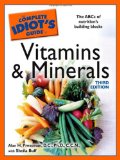|
Vitamins are vital compounds of a healthy diet. Vitamins themselves do not provide energy but there are indispensable for many metabolic processes.
Vitamins: In-depth
Vitamins are organic substances that the human body needs for certain vital functions. However the body is only able to synthesise certain vitamins in insufficient amounts. This makes the regular dietary intake of vitamins absolutely essential. The daily requirement of these micro-nutrients is small in comparison to the necessary amounts of nutrients which provide energy. Provitamins are precursor substances which are converted into vitamins in the body.
Requirements and recommended amounts:
Vitamin requirements vary from person to person and are dependant on physical and mental condition (e.g. illnesses or stress).
The following have to be taken into consideration for an adequate vitamin intake: age, sex, proficiency levels, health condition and diet.
The preferable daily amounts provided include a safety margin which exceeds the overall requirement. The given amounts do not need to be consumed everyday. However the dietary intake should correspond to these amounts on average.
Critical vitamins in Germany, i.e. vitamins where the dietary intake is below the recommended amounts include vitamins B1, B2, B6 and folic acid.
Nutritional recommendations are published in order to identify possible vitamin deficiencies. These recommendations apply to 97% of the population.
Below are the recommended dietary intakes from the Deutsche Gesellschaft für Ernährung (DGE - a German Nutrition Society) and the National Academy of Sciences (USA).
Recommended Dietary Intake (Germany)
Recommended Dietary Allowances (RDA) (USA)
You can also find the links above in the navigation bar.
If you look at the recommended dietary intake charts you will notice that there are rather varied recommendations. This shows that there is no certainty with regards to the amounts of vitamins and minerals that the body needs.
Individual requirements also vary. Different values of vitamins apply for men and women and for pregnant and lactating women. Other factors that influence nutritional requirements are age, health or stress.
top  
What You Must Know about Vitamins, Minerals, Herbs, & More: Choosing the Nutrients That Are Right for You,
M.D. Pamela Wartian Smith
|
Vitamins are divided into 2 groups:
Fat-soluble vitamins:
Vitamins A, D, E and K are fat-soluble vitamins. Fat-soluble vitamins are absorbed together with dietary fat. If these vitamins are consumed in excess amounts they are stored in the body. After a regular and sufficient intake humans can continue to live off these reserves and get by even with lower intake levels. The body can only excrete a small amount of these vitamins through the intestines. As a result, an overdose is possible. Exercise caution when self-medicating!
Water-soluble vitamins:
Vitamin C and the vitamin B-complex (vitamin B1, B2, B6, B12, niacin (PP), pantothenic acid (coenzyme A), folic acid (M), biotin (H), rutin (P), orotic acid (B13), pangamic acid (B15) are water-soluble vitamins. Water-soluble vitamins can only be stored in small amounts. The body's ability to store these vitamins varies: vitamin B1: 1-2 weeks, vitamin B2, B6, C and niacin: 2-6 weeks, folic acid: 3-4 months, vitamin B12: 3-5 years. It is therefore necessary to regularly consume the sufficient amounts that the body needs. Overdoses are removed from the body in the water of urine. In general it is difficult to overdose on water-soluble vitamins but it is not impossible.
top 

Earl Mindell's New Vitamin Bible,
Earl Mindell, Hester Mundis

Prescription for Nutritional Healing, Fifth Edition: A Practical A-to-Z Reference to Drug-Free Remedies Using Vitamins, Minerals, Herbs & Food Supplements, Phyllis A. Balch CNC

The Complete Idiot's Guide to Vitamins and Minerals, 3rd Edition, Alan H. Pressman, Sheila Buff
top  |

